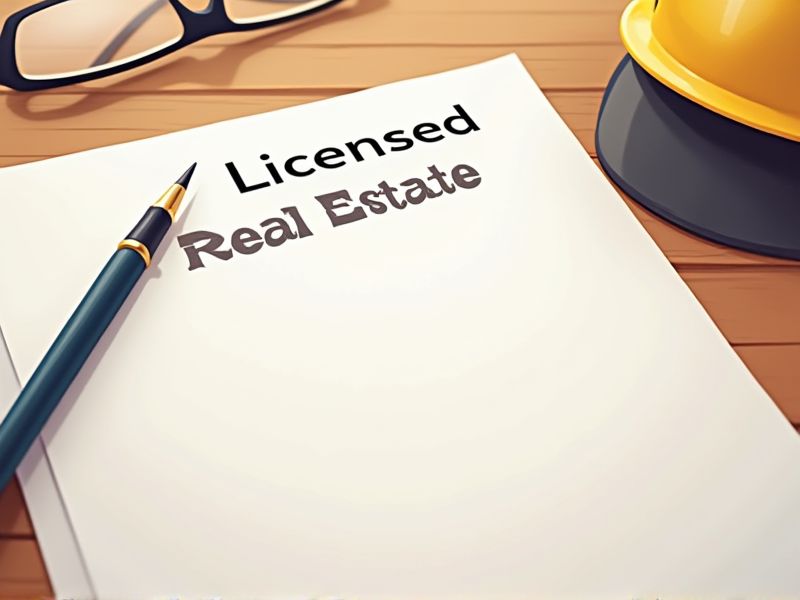
Licensed Real Estate Inspectors require certain certifications to ensure they possess the necessary skills and knowledge to conduct thorough property evaluations. These certifications validate an inspector's ability to assess structural integrity, safety hazards, and compliance with building codes, which is crucial for protecting clients and maintaining industry standards. Certification helps in gaining credibility and trust, enabling inspectors to provide accurate assessments that influence real estate transactions. Here are some important certifications required for a Licensed Real Estate Inspector.
InterNACHI Certified Professional Inspector (CPI)
InterNACHI Certified Professional Inspector (CPI) enhances credibility and trust with clients by adhering to high inspection standards. Training and exams provided by InterNACHI equip inspectors with comprehensive knowledge, ensuring accurate and thorough property evaluations. Continuous education requirements keep inspectors updated on best practices and evolving industry standards. Licensed Real Estate Inspectors gain a competitive advantage in the market by being CPI-certified, signaling commitment to quality and professionalism.
ASHI Certified Inspector
ASHI Certified Inspectors have undergone rigorous training, ensuring higher quality and reliable home inspections. This certification enhances a Licensed Real Estate Inspector's credibility, attracting more clients and fostering trust. Knowledge gained from ASHI standards empowers inspectors to identify potential issues more accurately. Real estate transactions benefit from the added assurance of an ASHI-backed evaluation, reducing future liabilities.
National Association of Home Inspectors (NAHI) Certification
The NAHI Certification provides reputable validation of a home inspector's expertise, enhancing trust and credibility in their services. Real estate clients often seek assurance of quality, and certified inspectors tend to meet industry standards more reliably. Licensed inspectors with NAHI Certification might experience increased demand, as clients prefer professionals verified by a respected organization. The certification process also encourages ongoing education, ensuring inspectors are updated with the latest industry practices and regulations.
Certified Building Inspector (CBI)
Certified Building Inspectors ensure compliance with building codes, affecting a property's safety and value, which is crucial for real estate transactions. Their expertise can identify structural issues, thus preventing potential future liabilities for the buyer. Their certification adds credibility to inspection reports, which can enhance buyer confidence and facilitate smoother negotiations. Licensing alone may not encompass the building-specific skills that a CBI certification provides, making their role integral for comprehensive assessments.
International Code Council (ICC) Residential Inspector Certification
Obtaining the ICC Residential Inspector Certification enhances a Licensed Real Estate Inspector's credibility, as it demonstrates a recognized standard of expertise in residential building codes. The certification equips inspectors with in-depth knowledge of construction practices and regulations, leading to more accurate and reliable property assessments. The standardization provided by ICC Certification ensures uniformity in inspection processes, which is critical in preventing errors that might result in costly liabilities or safety issues. In the competitive real estate market, having this certification distinguishes professionals from those without it, potentially leading to increased business opportunities and client trust.
EPA Lead-Safe Certification
The EPA Lead-Safe Certification ensures that licensed real estate inspectors are equipped to identify and handle lead hazards in properties, which reduces the risk of lead poisoning for occupants. Without this certification, inspectors might miss crucial signs of lead contamination, leading to potential health issues for residents, especially children. Properties built before 1978 often contain lead-based paint, and inspectors must accurately assess these risks to provide safe living environments. Certification also aligns professionals with regulatory compliance, enhancing trust and accountability in real estate transactions.
Mold Inspection Certification
Mold Inspection Certification equips licensed real estate inspectors with specialized knowledge to identify mold issues accurately, preventing potential health risks for property occupants. Real estate transactions often hinge on thorough inspections; having certification enhances inspector credibility and buyer trust. Mold problems can significantly impact property valuation; certified inspectors can provide precise assessments, protecting both buyer and seller investments. Regulatory requirements in many regions demand such certification to ensure public safety and uphold professional standards within the real estate industry.
Radon Measurement Specialist Certification
Radon gas poses significant health risks, making accurate measurement crucial for property buyers. A Radon Measurement Specialist Certification equips real estate inspectors with the skills to detect and interpret radon levels correctly. Licensed inspectors with this certification can assure clients of a comprehensive evaluation of the property's safety. The certification builds client trust and can enhance an inspector's professional credibility and service offerings.
Thermal Imaging Certification for Infrared Inspections
Thermal imaging certification equips licensed real estate inspectors to identify issues such as moisture intrusion, electrical faults, and insulation deficits that are invisible to the naked eye. By employing infrared technology, inspectors increase the accuracy and thoroughness of property evaluations, thereby enhancing client trust. Without specialized training, inspectors may misinterpret infrared data, potentially leading to inaccurate assessments or missed problems. Certified inspectors provide a competitive advantage in the real estate market, offering advanced diagnostic capabilities that elevate the standard of property inspections.
Electrical Systems Inspector Certification
Licensed real estate inspectors who obtain Electrical Systems Inspector Certification often gain increased credibility, as expertise in evaluating electrical systems enhances their reputation. This certification enables inspectors to identify electrical hazards and potential issues accurately, reducing liability risks in the inspection process. Professional development through such certification can also lead to increased job opportunities and career advancement, as it reflects a higher skill set. Many states and real estate agencies may also require or prefer certification to ensure thorough and safe property inspections.
Summary
When you, as a licensed real estate inspector, acquire additional certifications, your expertise is recognized, leading to increased trust from clients. With enhanced credentials, you often attract more business opportunities and a wider customer base. These certifications equip you with advanced skills, allowing you to offer more comprehensive inspections. Consequently, your career prospects and earning potential are likely to improve significantly.
